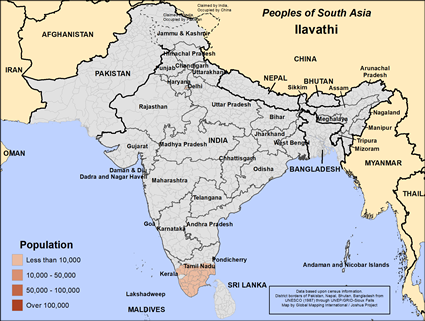Ilavathi in India

Send Joshua Project a photo
of this people group. |

Map Source:
People Group data: Omid. Map geography: UNESCO / GMI. Map Design: Joshua Project.
|
| People Name: | Ilavathi |
| Country: | India |
| 10/40 Window: | Yes |
| Population: | 54,000 |
| World Population: | 54,000 |
| Primary Language: | Malayalam |
| Primary Religion: | Hinduism |
| Christian Adherents: | 0.00 % |
| Evangelicals: | 0.00 % |
| Scripture: | Complete Bible |
| Ministry Resources: | Yes |
| Jesus Film: | Yes |
| Audio Recordings: | Yes |
| People Cluster: | South Asia Hindu - other |
| Affinity Bloc: | South Asian Peoples |
| Progress Level: |
|
Introduction / History
Historically the Ilavathi (Ezhavathi) were the barbers for the Ezthava caste. At one time they would not work for other castes. They originally came from Ernakulam district in India's southwestern state of Kerala. Today they live in Kerala and Tamil Nadu states.
What Are Their Lives Like?
As members of Other Backward Castes (OBC) the Ilavathi lived modestly, but now have taken advantage of education for both boys and girls. They are moving into other professions and work with other castes. Besides barbering, they have opened hair styling salons and other small businesses.
They prefer to marry within their caste, and they live in nuclear families. Marriage requires a dowry and is between adults (no child marriage). Finding a good mate for marriage can be a problem that has spawned many matrimonial websites on the internet.
They cremate adults but bury dead children.
What Are Their Beliefs?
These people are Hindus, yet they eat the meat of fish and cattle.
What Are Their Needs?
They are making progress, but being a recognized Backward Caste means that they are starting from a low position.
Prayer Points
Pray that the Christian churches in Kerala and Tamil Nadu will reach out to the Ilavathi community.
Pray that the Holy Spirit will draw them to Jesus.
Pray that as they advance economically, that they will seek God who values all people with no regard to caste.
Pray for many Ilavathi to disciple others in the ways of Jesus Christ.